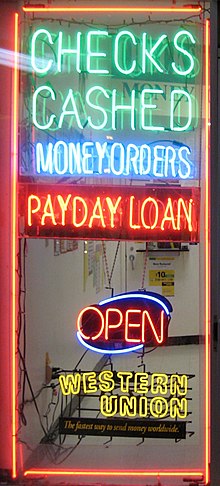
Back قرض يوم الدفع Arabic Krátkodobá půjčka Czech Kviklån Danish Kurzzeitkredit German وام روزپرداخت Persian Pikavippi Finnish הלוואה קצרת מועד HE Gyorskölcsön Hungarian Վարկ մինչ աշխատավարձ Armenian ペイデイローン Japanese

A payday loan (also called a payday advance, salary loan, payroll loan, small dollar loan, short term, or cash advance loan) is a short-term unsecured loan, often characterized by high interest rates. These loans are typically designed to cover immediate financial needs and are intended to be repaid on the borrower's next payday.
The term "payday" in payday loan refers to when a borrower writes a postdated check to the lender for the payday salary, but receives part of that payday sum in immediate cash from the lender.[1] However, in common parlance, the concept also applies regardless of whether repayment of loans is linked to a borrower's payday.[2][3][4] The loans are also sometimes referred to as "cash advances", though that term can also refer to cash provided against a prearranged line of credit such as a credit card. Legislation regarding payday loans varies widely between different countries, and in federal systems, between different states or provinces.
To prevent usury (unreasonable and excessive rates of interest), some jurisdictions limit the annual percentage rate (APR) that any lender, including payday lenders, can charge. Some jurisdictions outlaw payday lending entirely, while others have very few restrictions on payday lenders.
Payday loans have been linked to higher default rates.[5][6][7][8]
- ^ Stegman, Michael A (2007). "Payday Lending". Journal of Economic Perspectives. 21 (1): 169–190. doi:10.1257/jep.21.1.169. ISSN 0895-3309.
- ^ Insley, Jill (2012-07-12). "GE Money refuses mortgages to payday loan borrowers". The Guardian. London. Retrieved March 23, 2017.
- ^ Hodson, Michelle (January 29, 2003). "Payday Lending". FDIC. Archived from the original on 2012-12-12. Retrieved 2021-07-06.
{{cite web}}: CS1 maint: unfit URL (link) - ^ Ebony. FDIC. September 2005. Retrieved 7 October 2014.
- ^ Megan McArdle,The Atlantic, 18 November 2009, On Poverty, Interest Rates, and Payday Loans
- ^ Paige Skiba and Jeremy Tobacman, 10 December 2007, [1]: The Profitability of Payday Loans.
- ^ Skiba, Paige Marta; Tobacman, Jeremy (2019-08-01). "Do Payday Loans Cause Bankruptcy?". The Journal of Law and Economics. 62 (3): 485–519. doi:10.1086/706201. hdl:1803/9843. ISSN 0022-2186. S2CID 222329122.
- ^ Gathergood, John; Guttman-Kenney, Benedict; Hunt, Stefan (2019-02-01). "How Do Payday Loans Affect Borrowers? Evidence from the U.K. Market". The Review of Financial Studies. 32 (2): 496–523. doi:10.1093/rfs/hhy090. ISSN 0893-9454.